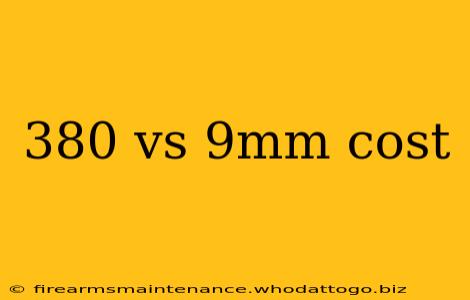380 ACP vs 9mm: A Deep Dive into Ammunition Costs
Choosing between the .380 ACP and 9mm pistol calibers often comes down to several factors, with cost being a significant one. While both are popular choices for self-defense and concealed carry, understanding the price differences and the reasons behind them is crucial for informed decision-making. This in-depth analysis will dissect the cost comparison, exploring the factors influencing ammunition prices for both calibers.
Understanding the Price Discrepancy: Why is 9mm Often Cheaper?
Generally, 9mm ammunition is considerably cheaper than .380 ACP ammunition. This price difference isn't arbitrary; several factors contribute:
-
Higher Demand & Production Volume: The 9mm is a far more popular cartridge globally. This massive demand drives economies of scale in manufacturing. Larger production runs translate to lower per-unit production costs, which are then passed on to the consumer. The .380 ACP, while popular, holds a significantly smaller market share.
-
Raw Materials: While the specific materials used vary slightly between manufacturers, the overall quantity of materials required to produce a 9mm round is generally less than for a .380 ACP round. This difference, though subtle, accumulates across millions of rounds produced, impacting overall cost.
-
Market Competition: The greater popularity of 9mm also fuels competition among ammunition manufacturers. This competitive landscape keeps prices relatively low as manufacturers strive to offer the most competitive pricing. The smaller market for .380 ACP allows for less price competition.
-
Distribution & Retail Markups: While the base manufacturing cost differs, the distribution network and retail markups also play a role. The sheer volume of 9mm ammunition moved through the supply chain allows for more efficient distribution, potentially reducing costs associated with shipping and handling.
Current Market Trends and Fluctuations
It's vital to acknowledge that ammunition prices are incredibly dynamic. Factors such as raw material costs (lead, brass, primers, powder), political climate, and even seasonal demand can significantly influence prices. What holds true for today's market may not be the case tomorrow. Regularly checking prices from various reputable vendors is crucial.
Beyond Price: Other Factors to Consider
While cost is an important factor, it shouldn't be the sole determinant in choosing a caliber. Other key considerations include:
-
Ballistics: 9mm generally offers greater stopping power and range compared to .380 ACP. The larger caliber and higher velocity contribute to this advantage.
-
Recoil: .380 ACP boasts noticeably less recoil than 9mm, making it potentially more comfortable for smaller-framed individuals or novice shooters. Reduced recoil can also improve accuracy and speed of follow-up shots.
-
Concealability: The smaller size of the .380 ACP makes it more suitable for ultra-compact concealed carry pistols. However, advancements in 9mm pistol designs have resulted in increasingly smaller and more concealable options.
-
Availability: While 9mm is generally more readily available, the current ammunition market remains volatile. Availability can fluctuate based on various factors, so it’s wise to check local availability before committing to a specific caliber.
Conclusion
In summary, while 9mm ammunition is typically less expensive than .380 ACP, the price difference alone shouldn't dictate your choice. Carefully weigh the factors discussed—ballistics, recoil, concealability, and availability—along with your personal needs and shooting experience to make an informed decision. Remember to check current prices from multiple vendors to get a clear picture of the current market conditions before purchasing ammunition.

